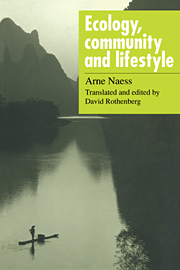Book contents
- Frontmatter
- Contents
- Translator's preface
- Introduction: Ecosophy T – from intuition to system
- 1 The environmental crisis and the deep ecological movement
- 2 From ecology to ecosophy
- 3 Fact and value; basic norms
- 4 Ecosophy, technology, and lifestyle
- 5 Economics within ecosophy
- 6 Ecopolitics within ecosophy
- 7 Ecosophy T: unity and diversity of life
- Bibliography
- Index
4 - Ecosophy, technology, and lifestyle
Published online by Cambridge University Press: 13 October 2009
- Frontmatter
- Contents
- Translator's preface
- Introduction: Ecosophy T – from intuition to system
- 1 The environmental crisis and the deep ecological movement
- 2 From ecology to ecosophy
- 3 Fact and value; basic norms
- 4 Ecosophy, technology, and lifestyle
- 5 Economics within ecosophy
- 6 Ecopolitics within ecosophy
- 7 Ecosophy T: unity and diversity of life
- Bibliography
- Index
Summary
Ecosophical consciousness and lifestyle
How would mankind's present role on this planet be evaluated in the light of philosophical world-views of the past? No matter which one of the great philosophies one considers to be valid, our current role would be evaluated negatively. It is in opposition to value priority as announced by these philosophies. This applies to Aristotelianism, Buddhism, Confucianism, and other great philosophies of the last two millennia.
In the great philosophies, greatness and bigness are differentiated. Greatness is sought, but it is not magnitude. The importance of technology is recognised, but cultural values get priority of consideration. The good life is not made dependent upon thoughtless consumption.
In the great philosophies, people are required to attempt to evaluate the distant consequences of their actions and the perspective used is to be universal in time and space. None of the great philosophers regarded market relations and modes of production as the source of norms for state, society, or individual. The importance of economic relations is recognised but seen as a fragment within the web of social relationships.
My conclusion is that there is no articulated world-view which endorses mankind's current role in the ecosphere. Environmentalism has no articulated philosophical system to fear.
But this does not furnish any potent consolation in the situation characterised in the opening of the book. The question must be raised: how are the ecologically destructive, but ‘firmly established ways of production and consumption’ (p. 23) to be changed?
- Type
- Chapter
- Information
- Ecology, Community and LifestyleOutline of an Ecosophy, pp. 87 - 103Publisher: Cambridge University PressPrint publication year: 1989



